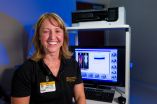Searching the Internet inflates estimates of internal knowledge
An article spotlight
2015-08-12
(Press-News.org) Working in groups is advantageous because different individuals can be responsible for different information, allowing each individual to develop more in-depth expertise. For instance, a plumber, electrician, and carpenter work together to build a house, but each is responsible for unique aspects of the project. This is an example of a transactive memory system: information is distributed across the group, and each group member is aware of what he or she knows, as well as who knows what.
Because the Internet surpasses any person in accessibility, speed, and breadth of knowledge, the Internet may be treated as an all-knowing expert transactive memory partner. However, in a recent paper in the Journal of Experimental Psychology: General, Fisher, Goddu, and Keil (2015) suggest that these same features may exacerbate potentially negative effects of transactive memory, in particular conflating knowledge for which a partner is responsible with knowledge one actually possesses.
Each of the experiments had an induction phase followed by a self-assessment phase. In the induction phase, participants rated their ability to explain the answers to common questions (e.g., "How do zippers work?") after either searching the Internet to confirm their explanation, or being specifically instructed not to use the Internet. In the subsequent self-assessment phase, participants were asked to rate how well they could explain the answers to groups of questions from a variety of domains that were unrelated to the induction phase questions.
Participants who searched the Internet in the induction phase rated themselves as being able to give better explanations than participants who were not allowed to search the Internet. This result was obtained even when participants in the Internet condition were given a specific web source to find (e.g., "Please search the scientificamerican.com page for this information") and participants in the no Internet condition were shown text from that same website. In other words, searching for explanations online led to increases in self-assessed knowledge even when both groups had access to the same explanatory content, and when Internet search did not involve effortful processes like choosing between sources. Higher self-assessed knowledge was also observed following unsuccessful Internet searches (e.g., searches that did not yield an answer to the question).
Increases in self-assessed knowledge following Internet search were reduced or eliminated in the following conditions: 1) when participants were provided with a link to access the web source in the induction phase, and 2) when autobiographical knowledge was probed in the self-assessment phase. These results suggest that it is the act of searching online that promotes increases in self-assessed knowledge, and this effect is limited to domains where the Internet might plausibly be of use.
Together, this series of experiments demonstrates that actively searching the Internet inflates our sense of the knowledge we actually possess because we fail to recognize the extent to which we rely on external sources for information. While similar illusions of knowledge have been obtained for other external information sources, these illusions may be particularly strong for the Internet because online information is easily and nearly constantly accessible, is retrieved quickly, and covers an incredible breadth of content. Such access to information has many benefits, but the authors caution that the strength of the illusion of knowledge with respect to the Internet could have negative consequences in situations in which the Internet is not available, and individuals think they know more than they really do.
INFORMATION:
[Article Spotlight: Experimental Psychology features summaries of recently published articles from APA's experimental psychology journals. The Spotlight will highlight one recently published article, chosen by the Editor as particularly noteworthy to the scientific community.]
ELSE PRESS RELEASES FROM THIS DATE:
2015-08-12
COLUMBIA, Mo. (Aug. 12, 2015) Approximately 60 percent of young people habitually skip breakfast up to four times a week, previous research has shown. Although health experts recommend breakfast as a strategy to reduce an individual's chance of obesity, little research has examined if the actual type of breakfast consumed plays a significant role in one's health and weight management. University of Missouri researchers compared the benefits of consuming a normal-protein breakfast to a high-protein breakfast and found the high-protein breakfast - which contained 35 grams ...
2015-08-12
All freshwater streams and rivers actually release carbon dioxide, but the source of those emissions has for years been unclear to scientists.
Now, researchers have shown that the greenhouse gas appears in streams by way of two different sources -- either as a direct pipeline for groundwater and carbon-rich soils, or from aquatic organisms releasing the gas through respiration and natural decay.
CO2's origins -- land or life -- depend largely on the size of the stream or river, according to a paper published Aug. 10 in Nature Geosciences. These findings shed light ...
2015-08-12
For any computer, being able to manipulate information is essential, but for quantum computing, singling out one data location without influencing any of the surrounding locations is difficult. Now, a team of Penn State physicists has a method for addressing individual neutral atoms without changing surrounding atoms.
"There are a set of things that we have to have to do quantum computing," said David S. Weiss, professor of physics. "We are trying to step down that list and meet the various criteria. Addressability is one step."
Quantum computers are constructed and ...
2015-08-12
Simply put, cancer is caused by mutations to genes within a cell that lead to abnormal cell growth. Finding out what causes that genetic mutation has been the holy grail of medical science for decades. Researchers at the Texas A&M Health Science Center Institute of Biosciences and Technology believe they may have found one of the reasons why these genes mutate and it all has to do with how stem cells talk to each other.
The landmark studies by Texas A&M researchers Fen Wang, Ph.D., and Wallace McKeehan, Ph.D., appear in the Journal of Biological Chemistry and are available ...
2015-08-12
CAMBRIDGE, MA -- Chemists working in a variety of industries and fields typically go through a laborious process to measure and mix reagents for each reaction they perform. And many of the common reagents they use sit for months or years on shelves in laboratories, where they can react with oxygen and water in the atmosphere, rendering them useless.
In a paper published this week in Nature, researchers at MIT describe a technique that could help avoid this costly waste, and greatly reduce the number of steps a chemist must perform to prepare common compounds for use in ...
2015-08-12
Male elephant seals compete fiercely for access to females during the breeding season, and their violent, bloody fights take a toll on both winners and losers. These battles are relatively rare, however, and a new study shows that the males avoid costly fights by learning the distinctive vocal calls of their rivals. When they recognize the call of another male, they know whether to attack or flee depending on the challenger's status in the dominance hierarchy.
Researchers from UC Santa Cruz have been studying the behavior of northern elephant seals at Año Nuevo ...
2015-08-12
BOSTON - Researchers from Beth Israel Deaconess Medical Center (BIDMC) are homing in on the potential benefits of allowing patients access to the notes their clinicians write after a visit. An article published in the August edition of The Joint Commission Journal on Quality and Patient Safety suggests that this kind of patient engagement has the power to improve safety and quality of care.
The practice of sharing visit notes more readily began with the OpenNotes study in 2010. More than 100 primary care doctors at three hospitals invited 20,000 of their patients to ...
2015-08-12
In debt and don't know what to do? Conventional economic wisdom says to pay off high-interest loans first. Yet according to a new study in the Journal of Marketing Research, paying off your smallest debts first can provide the motivation you need to successfully pay off even the most burdensome debts.
"Winning what are known as 'small victories' by paying off small debts first can give consumers a real boost in eventually paying off all their debts," write the authors of the study, Alexander L. Brown (Texas A&M University) and Joanna N. Lahey (Texas A&M University). "The ...
2015-08-12
Legos, the popular toy bricks, may be great for stimulating creativity in little kids. But when it comes to adults, things might be a little different. According to a new study in the Journal of Marketing Research, when adults are given a set of Legos to solve a well-defined problem, their creativity may suffer when tackling subsequent tasks.
"There are a lot of studies that explore what enhances creativity. Ours is one of the few that considers ways in which creativity may be undermined," write the authors of the study, C. Page Moreau (University of Wisconsin) and Marit ...
2015-08-12
Attention all you would-be forecasters out there. Do you want people to think you know the future? Then predict with a high degree of certainty that something will happen. According to a new study in the Journal of Marketing Research, people trust a forecaster more when she predicts that something is more likely to occur.
"When a forecaster predicts that something has a high likelihood of happening, consumers infer that the forecaster is more confident in her prediction, that she is basing the prediction on more in-depth analysis, and that she is more trustworthy," write ...
LAST 30 PRESS RELEASES:
[Press-News.org] Searching the Internet inflates estimates of internal knowledge
An article spotlight


